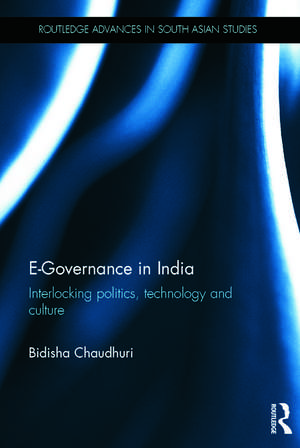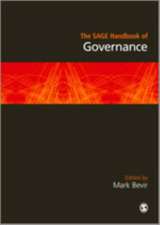E-Governance in India: Interlocking politics, technology and culture: Routledge Advances in South Asian Studies
Autor Bidisha Chaudhurien Limba Engleză Hardback – 27 mai 2014
This book analyses e-Governance in India and argues that such initiatives did not take place in isolation but followed in the footsteps of broader governance reform agenda that has already made considerable impact on the discourses and practices of governance in India. Employing interdisciplinary methodology by combining approaches from the Political Sciences, Sociology and Postcolonial/ transcultural studies, this book presents a qualitative account of the policies and practices of e-Governance reform in India along with a detailed case study of the Common Services Centres (CSCs) Scheme under the National e-Governance Plan of the Government of India and its resultant impact on the overall system of governance. It unfolds general theoretical issues in terms of the relationship between technology and governance and the entanglement of politics, technology and culture in the complex whole of governance. This furthers our understanding of the impact of the transnational governance reform agenda on post-colonial and post-communist societies of the developing world.
Making an important and original contribution to the emerging field of e-Governance and to the existing body of research on governance in general, this book will be of interest to students and scholars of Political Science, Political Sociology, South Asian Politics and Governance.
Din seria Routledge Advances in South Asian Studies
-
 Preț: 349.17 lei
Preț: 349.17 lei -
 Preț: 321.41 lei
Preț: 321.41 lei -
 Preț: 317.67 lei
Preț: 317.67 lei - 16%
 Preț: 298.10 lei
Preț: 298.10 lei - 26%
 Preț: 567.75 lei
Preț: 567.75 lei - 20%
 Preț: 184.81 lei
Preț: 184.81 lei - 16%
 Preț: 323.44 lei
Preț: 323.44 lei -
 Preț: 420.08 lei
Preț: 420.08 lei -
 Preț: 415.67 lei
Preț: 415.67 lei - 11%
 Preț: 304.68 lei
Preț: 304.68 lei -
 Preț: 276.84 lei
Preț: 276.84 lei - 14%
 Preț: 301.13 lei
Preț: 301.13 lei - 15%
 Preț: 721.51 lei
Preț: 721.51 lei - 25%
 Preț: 766.66 lei
Preț: 766.66 lei -
 Preț: 485.46 lei
Preț: 485.46 lei - 18%
 Preț: 1001.84 lei
Preț: 1001.84 lei - 18%
 Preț: 1052.35 lei
Preț: 1052.35 lei -
 Preț: 416.96 lei
Preț: 416.96 lei - 16%
 Preț: 298.41 lei
Preț: 298.41 lei - 18%
 Preț: 1001.07 lei
Preț: 1001.07 lei - 18%
 Preț: 1110.81 lei
Preț: 1110.81 lei - 18%
 Preț: 1058.79 lei
Preț: 1058.79 lei -
 Preț: 486.71 lei
Preț: 486.71 lei - 15%
 Preț: 675.24 lei
Preț: 675.24 lei -
 Preț: 278.75 lei
Preț: 278.75 lei - 18%
 Preț: 1054.97 lei
Preț: 1054.97 lei -
 Preț: 418.22 lei
Preț: 418.22 lei -
 Preț: 416.22 lei
Preț: 416.22 lei -
 Preț: 279.94 lei
Preț: 279.94 lei -
 Preț: 371.68 lei
Preț: 371.68 lei - 16%
 Preț: 297.62 lei
Preț: 297.62 lei - 18%
 Preț: 1053.95 lei
Preț: 1053.95 lei - 15%
 Preț: 699.73 lei
Preț: 699.73 lei
Preț: 846.53 lei
Preț vechi: 1215.12 lei
-30% Nou
Puncte Express: 1270
Preț estimativ în valută:
162.03€ • 176.06$ • 136.20£
162.03€ • 176.06$ • 136.20£
Carte tipărită la comandă
Livrare economică 21 aprilie-05 mai
Preluare comenzi: 021 569.72.76
Specificații
ISBN-13: 9780415737906
ISBN-10: 0415737907
Pagini: 170
Ilustrații: 16
Dimensiuni: 156 x 234 x 15 mm
Greutate: 0.39 kg
Ediția:1
Editura: Taylor & Francis
Colecția Routledge
Seria Routledge Advances in South Asian Studies
Locul publicării:Oxford, United Kingdom
ISBN-10: 0415737907
Pagini: 170
Ilustrații: 16
Dimensiuni: 156 x 234 x 15 mm
Greutate: 0.39 kg
Ediția:1
Editura: Taylor & Francis
Colecția Routledge
Seria Routledge Advances in South Asian Studies
Locul publicării:Oxford, United Kingdom
Public țintă
PostgraduateCuprins
1. Introduction 2. Linking Governance, Reform and Technology: The Research Methodology 3. E-governance in India: A Chronological Overview of Policies and Practices 4. E-governance in Context : A Case Study of Common Services Centres (CSCs) 5. Bridging State and Society : E-Governance at the crossroad of politics, technology and culture 6. Conclusion: A General framework of understanding governance and e-governance
Notă biografică
Bidisha Chaudhuri completed her PhD at the South Asia Institute, Heidelberg University, Germany. She is currently a consulting faculty member at the Centre for Information Technology and Public Policy (CITAPP) at the International Institute of Information Technology, Bangalore, India. Her research interests include governance, gender and development, ICT for development, policy reform and South Asian politics.
Descriere
E-governance has been one of the strategic sectors of reform in India since late 1990s under the rubric of ‘good governance’ agenda promoted by International Organisations. This book analyses e-governance in India and argues that such initiatives did not take place in isolation but followed in the footsteps of broader governance reform agenda that has already made considerable impact on the discourses and practices of governance in India. Employing interdisciplinary methodology by combining approaches from the Political Sciences, Sociology and Postcolonial/ Transcultural Studies, this book presents a qualitative account of the policies and practices of e-governance reform in India along with a detailed case study of the Common Services Centres (CSCs) Scheme under the National e-Governance Plan of the Government of India and its resultant impact on the overall system of governance.











